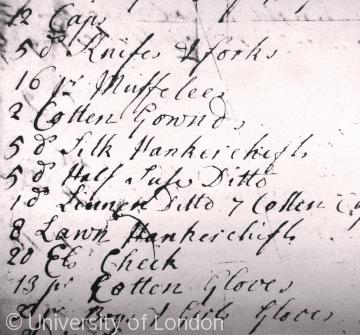Thomas Butterton, chapman, 1750 - Basingstoke

Many villagers depended for small purchases on travelling salesmen or chapmen who sold personal goods such as gloves, lace, pins, stockings, handkerchiefs, ribbon and cheap jewelry in rural areas. They offered small decorative and practical items without the need for purchasers to travel to the nearest market town. The chapmen could be small scale pedlars or hawkers, travelling on foot across a small area or more substantial salesmen, with a horse and pack saddle or cart, to carry their wares. The attached inventory shows that Thomas Butterton of Basingstoke belonged to the latter category and was a wealthy salesman who possessed a shop and goods worth £105. He had four horses and two carts to transport the dozens of gloves, stockings and other wares into the rural areas surrounding Basingstoke. He probably employed other chapmen to help to sell his wares.
Chapmen from the 16th century were famous for cultural as well as economic reasons as they sold small books known as chapbooks which were priced very cheaply and contained a selection of the 3000 published ballads or popular versions of fables, romances, biblical texts and moral stories. These chapbooks encouraged the spread of literacy and knowledge among the poor who could listen to a neighbour reading from a chapbook. Margaret Spufford has studied and publicized the importance of chapbooks. Butterton at the time of his death stocked knives and forks, gloves and caps but unfortunately no little books.
Content derived during research for the new VCH Hampshire volume, Basingstoke and its surroundings.


